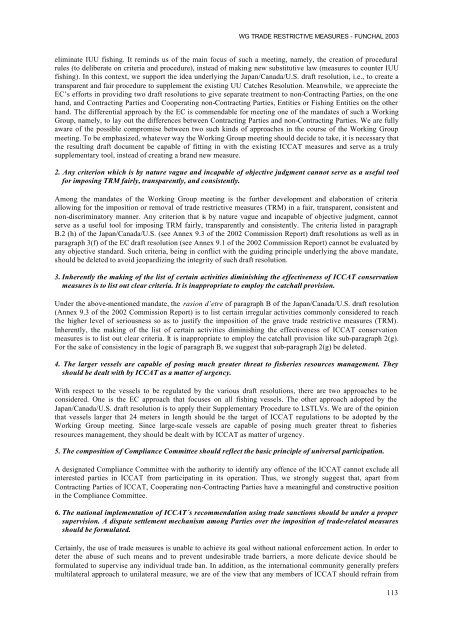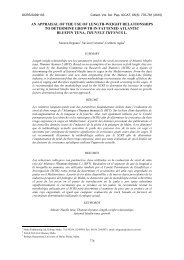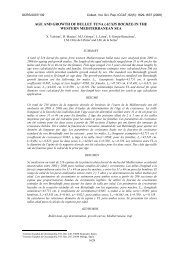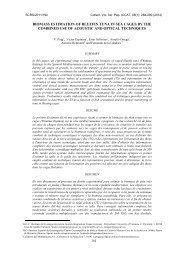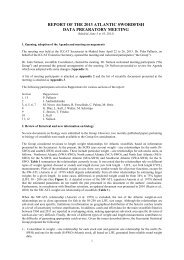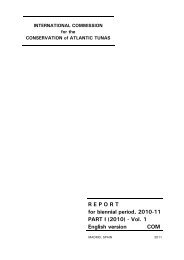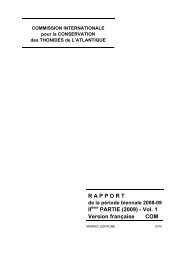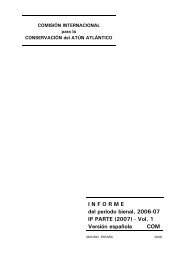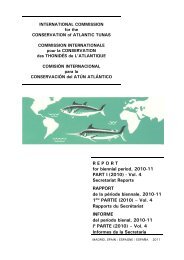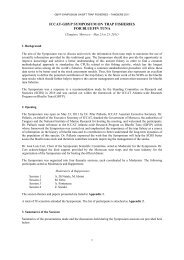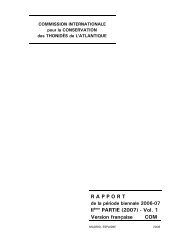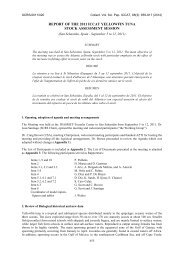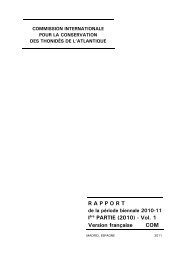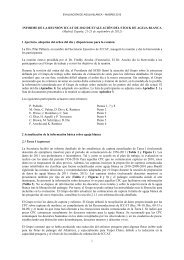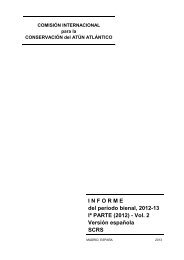E - Iccat
E - Iccat
E - Iccat
Create successful ePaper yourself
Turn your PDF publications into a flip-book with our unique Google optimized e-Paper software.
WG TRADE RESTRICTIVE MEASURES - FUNCHAL 2003<br />
eliminate IUU fishing. It reminds us of the main focus of such a meeting, namely, the creation of procedural<br />
rules (to deliberate on criteria and procedure), instead of making new substitutive law (measures to counter IUU<br />
fishing). In this context, we support the idea underlying the Japan/Canada/U.S. draft resolution, i.e., to create a<br />
transparent and fair procedure to supplement the existing UU Catches Resolution. Meanwhile, we appreciate the<br />
EC’s efforts in providing two draft resolutions to give separate treatment to non-Contracting Parties, on the one<br />
hand, and Contracting Parties and Cooperating non-Contracting Parties, Entities or Fishing Entities on the other<br />
hand. The differential approach by the EC is commendable for meeting one of the mandates of such a Working<br />
Group, namely, to lay out the differences between Contracting Parties and non-Contracting Parties. We are fully<br />
aware of the possible compromise between two such kinds of approaches in the course of the Working Group<br />
meeting. To be emphasized, whatever way the Working Group meeting should decide to take, it is necessary that<br />
the resulting draft document be capable of fitting in with the existing ICCAT measures and serve as a truly<br />
supplementary tool, instead of creating a brand new measure.<br />
2. Any criterion which is by nature vague and incapable of objective judgment cannot serve as a useful tool<br />
for imposing TRM fairly, transparently, and consistently.<br />
Among the mandates of the Working Group meeting is the further development and elaboration of criteria<br />
allowing for the imposition or removal of trade restrictive measures (TRM) in a fair, transparent, consistent and<br />
non-discriminatory manner. Any criterion that is by nature vague and incapable of objective judgment, cannot<br />
serve as a useful tool for imposing TRM fairly, transparently and consistently. The criteria listed in paragraph<br />
B.2 (h) of the Japan/Canada/U.S. (see Annex 9.3 of the 2002 Commission Report) draft resolutions as well as in<br />
paragraph 3(f) of the EC draft resolution (see Annex 9.1 of the 2002 Commission Report) cannot be evaluated by<br />
any objective standard. Such criteria, being in conflict with the guiding principle underlying the above mandate,<br />
should be deleted to avoid jeopardizing the integrity of such draft resolution.<br />
3. Inherently the making of the list of certain activities diminishing the effectiveness of ICCAT conservation<br />
measures is to list out clear criteria. It is inappropriate to employ the catchall provision.<br />
Under the above-mentioned mandate, the rasion d’etre of paragraph B of the Japan/Canada/U.S. draft resolution<br />
(Annex 9.3 of the 2002 Commission Report) is to list certain irregular activities commonly considered to reach<br />
the higher level of seriousness so as to justify the imposition of the grave trade restrictive measures (TRM).<br />
Inherently, the making of the list of certain activities diminishing the effectiveness of ICCAT conservation<br />
measures is to list out clear criteria. It is inappropriate to employ the catchall provision like sub-paragraph 2(g).<br />
For the sake of consistency in the logic of paragraph B, we suggest that sub-paragraph 2(g) be deleted.<br />
4. The larger vessels are capable of posing much greater threat to fisheries resources management. They<br />
should be dealt with by ICCAT as a matter of urgency.<br />
With respect to the vessels to be regulated by the various draft resolutions, there are two approaches to be<br />
considered. One is the EC approach that focuses on all fishing vessels. The other approach adopted by the<br />
Japan/Canada/U.S. draft resolution is to apply their Supplementary Procedure to LSTLVs. We are of the opinion<br />
that vessels larger that 24 meters in length should be the target of ICCAT regulations to be adopted by the<br />
Working Group meeting. Since large-scale vessels are capable of posing much greater threat to fisheries<br />
resources management, they should be dealt with by ICCAT as matter of urgency.<br />
5. The composition of Compliance Committee should reflect the basic principle of universal participation.<br />
A designated Compliance Committee with the authority to identify any offence of the ICCAT cannot exclude all<br />
interested parties in ICCAT from participating in its operation. Thus, we strongly suggest that, apart from<br />
Contracting Parties of ICCAT, Cooperating non-Contracting Parties have a meaningful and constructive position<br />
in the Compliance Committee.<br />
6. The national implementation of ICCAT´s recommendation using trade sanctions should be under a proper<br />
supervision. A dispute settlement mechanism among Parties over the imposition of trade-related measures<br />
should be formulated.<br />
Certainly, the use of trade measures is unable to achieve its goal without national enforcement action. In order to<br />
deter the abuse of such means and to prevent undesirable trade barriers, a more delicate device should be<br />
formulated to supervise any individual trade ban. In addition, as the international community generally prefers<br />
multilateral approach to unilateral measure, we are of the view that any members of ICCAT should refrain from<br />
113


